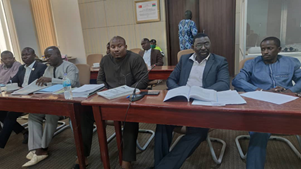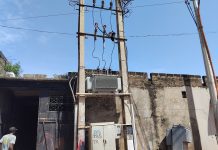By Kebba A.F. Touray
[Banjul, 13th February, 2023] The financial statement of the Kanifing Municipal Council for 2021 that was presented before the lawmakers on Monday indicated that the council recorded an income of D280,429,161.15.
Sheriff Njie, Deputy Director of Finance at the Council said the Council in the year 2020 recorded a total income of D213,791,284.14. This shows that the council registered an increase in the income of D66,637,877.01.
On the other hand, the council also made a total expenditure of D213, 220,640.25 in 2020 and a total expenditure of D260, 258,993.29 in 2021.
From the figures, by subtracting the expenditure of 2021 from the income, the council will be left with D20,170,167.86.
Council officials appeared before the National Assembly’s Finance and Public Accounts Committee (FPAC) for the presentation of their activity reports and financial statements for 2020 and 2021.
Kajali Janneh, the Deputy Chief Executive Officer informed the lawmakers that in 2020 and 2021 the council had spent over D3.7 million to establish ward development offices in all the 19 wards within the municipality. Janneh said they spent D800,000 to train staff in various areas relevant to their respect jobs including human resources management.
“In order to improve the revenue collection systems for the trade license, the council in 2020 spent D879, 190 to acquire server hosting and maintenance fee for new trade license software system as well as genuine license from Microsoft and India Institute of High Technology (IIHT),” the council’s report indicated.
It added that as at 31st December 2020, the council collected a total revenue of D222,812,979.00 and part of the amount is revenue from council’s new revenue line (user fees at the Bakoteh Dumpsite and fines from anti-littering) were introduced in 2020.
In 2021 fiscal year, the council reported that it has spent over D2,000,000 on building the capacities of councilors and administrative staff. The Council spent a total of D11, 204,328.98 for maintenance and repair of vehicles.
The report detailed that that Council in 2021 continued to support the decentralized structures in ensuring effective community outreach and service delivery to the people. In setting up these offices, council provided office equipment such as computers, tables, chairs, ceiling fans, water dispensers and internet facilities at a tune of D5, 127,185.
Officials of the Gambia Public Procurement Authority (GPPA) in their observation discovered that there is no annual consolidated procurement plan for the periods under review (2020 and 2021) as stipulated in the GPPA Act.
GPPA thus recommended that KMC should prepare a procurement plant to achieve value for money, establish a disposal committee, establish an inspection committee, and to enter into a framework agreement with routine procurements such as fuel, hiring of bulldozer and to ensure that the Specialized Procurement Unit be directly answerable to the Director General.
The GPPA concluded that based on the observations on the procurement transactions of the KMC in 2020 the council was found to be 67% compliant, which denoted that the Council was partially compliant while they recorded 72% in 2021, which denoted that the Council was mainly compliant.
Bakary Trawally, Director of Audit for Councils and Municipalities stated that the KMC did not among other issues present invoices for licence payments for the auditing process to confirm that the actual invoice amounts agreed with the receipts.
“In the absence of the invoices, the correctness of license figure of GMD83,535,179.12 reported on the revenue and expenditure statement could not be verified,” said the audit office.
The auditors also noted arrears of rates of GMD242,450,956.97 and GMD253,404,553.58 for the years 2020 and 2021 respectively in respect of residential and commercial rates.
The auditors recommended for the management of KMC to institute a mechanism to ensure that these arrears are recovered and rates collected on time. The auditors stated that the implication is that the uncontrolled arrears might result in significant cash flow problems for the council and might limit council contributions to provide the required services to its wards and the public.




















